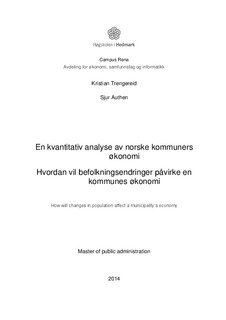| dc.contributor.author | Trengereid, Krisitan | |
| dc.contributor.author | Authen, Sjur | |
| dc.date.accessioned | 2014-12-18T09:25:58Z | |
| dc.date.available | 2014-12-18T09:25:58Z | |
| dc.date.issued | 2014 | |
| dc.identifier.uri | http://hdl.handle.net/11250/227740 | |
| dc.description | Erfaringsbasert master, 30 poengs avhandling. | |
| dc.description.abstract | Problemstillingen i oppgaven er om endringer i folketallet påvirker en kommunes finansielle økonomi. Med finansiell økonomi mener vi forholdet mellom inntekter og utgifter målt ved nettodriftsresultat, investeringsutgifter i prosent av driftsinntekter, arbeidskapital i prosent av driftsinntekter, bruk av lån, lånegjeld og gjeldsgrad.
Inntektssystemet for kommunene i Norge skal først og fremst sikre utjevning av de økonomiske forutsetningene for et likeverdig kommunalt tjenestetilbud i alle deler av landet. Det har som et viktig mål å sikre gode kommunale tjenester for innbyggerne uavhengig av om man bor i vekstkommuner eller fraflyttingskommuner. Med utgangspunkt i data fra SSB har vi sett på hvordan enkelte finansielle og økonomiske måltall har utviklet seg i perioden 2005 – 2013 og om det er noen sammenheng mellom disse økonomiske måltallene og befolkningsendringer.
Våre analyser viser at det ikke er stor grad av korrelasjon mellom befolkningsendringer og disse måltallene når vi trekker alle kommunene inn. Disse analysene understøtter derfor ikke hypotesen om at det er stor sammenheng mellom størrelsen på befolkningsendringer og kommunenes finansielle situasjon målt ved nettodriftsresultat, investeringsnivå, nivå på arbeidskapital, bruk av lån, lånegjeld og gjeldsgrad.
Når vi ikke finner stor grad av samvariasjon i materialet som omfatter alle kommunene kan det skyldes andre forhold. For eksempel at kommuners evne til å tilpasse seg finansielt til endrede økonomiske rammebetingelser er god eller at inntektssystemet til kommunesektoren i større grad enn forventet fanger opp effektene av befolkningsendringer | nb_NO |
| dc.description.abstract | Engelsk: The main question of this master thesis is how changes in population affects a municipality's financial economy. With financial economics we mean the ratio between income and expenditure as measured by net operating income, capital expenditures as a percentage of revenues, working capital as a percentage of revenues, the use of loans, debt and debt ratio.
Income system for municipalities in Norway is primarily intended to ensure the cohesion of the economic preconditions for equal municipal services in all parts of the country. Its primary objective is to ensure good municipal services for citizens regardless of whether they live in growing municipalities or municipalities with depopulation. Based on data from Statistics Norway, we have seen how some financial and economic indicators have evolved over the period 2005 - 2013 and whether there is any connection between these economic indicators and population changes.
Our analysis shows that there is not a high degree of correlation between population change and these indicators. These analyzes does not support the hypothesis that there is a high correlation between the size of population change and the municipal financial situation measured by net operating income, investment level, the level of working capital, using loans, debt and debt ratio.
When we don’t find a high degree of correlation in this material, it may be due to other circumstances. For example, that the municipalities' ability to adapt financially to changing economic conditions is good, or that the revenue system to the municipal sector to a greater extent than expected compensate for the effects of population changes. | |
| dc.language.iso | nob | nb_NO |
| dc.subject | kommuneøkonomi | nb_NO |
| dc.subject | Befolkningsutvikling | nb_NO |
| dc.subject | Befolkningsendringer | nb_NO |
| dc.subject | inntektsystemet | nb_NO |
| dc.title | En kvantitativ analyse av norske kommuners økonomi. Hvordan vil befolkningsendringer påvirke en kommunes økonomi | nb_NO |
| dc.title.alternative | How will changes in population affect a municipality’s economy | nb_NO |
| dc.type | Master thesis | nb_NO |
| dc.subject.nsi | VDP::Social science: 200::Political science and organizational theory: 240 | nb_NO |
| dc.source.pagenumber | 100 | nb_NO |
